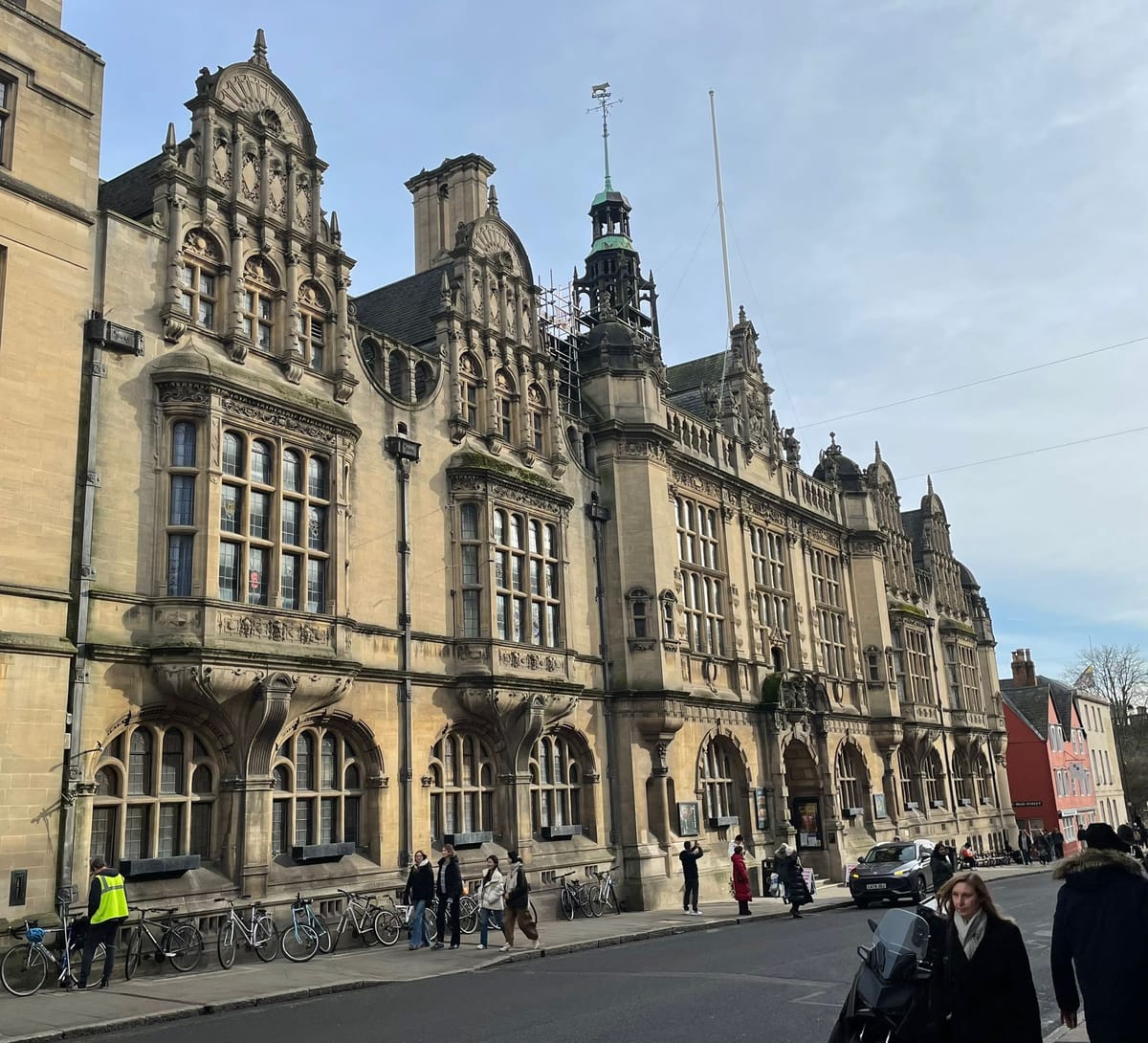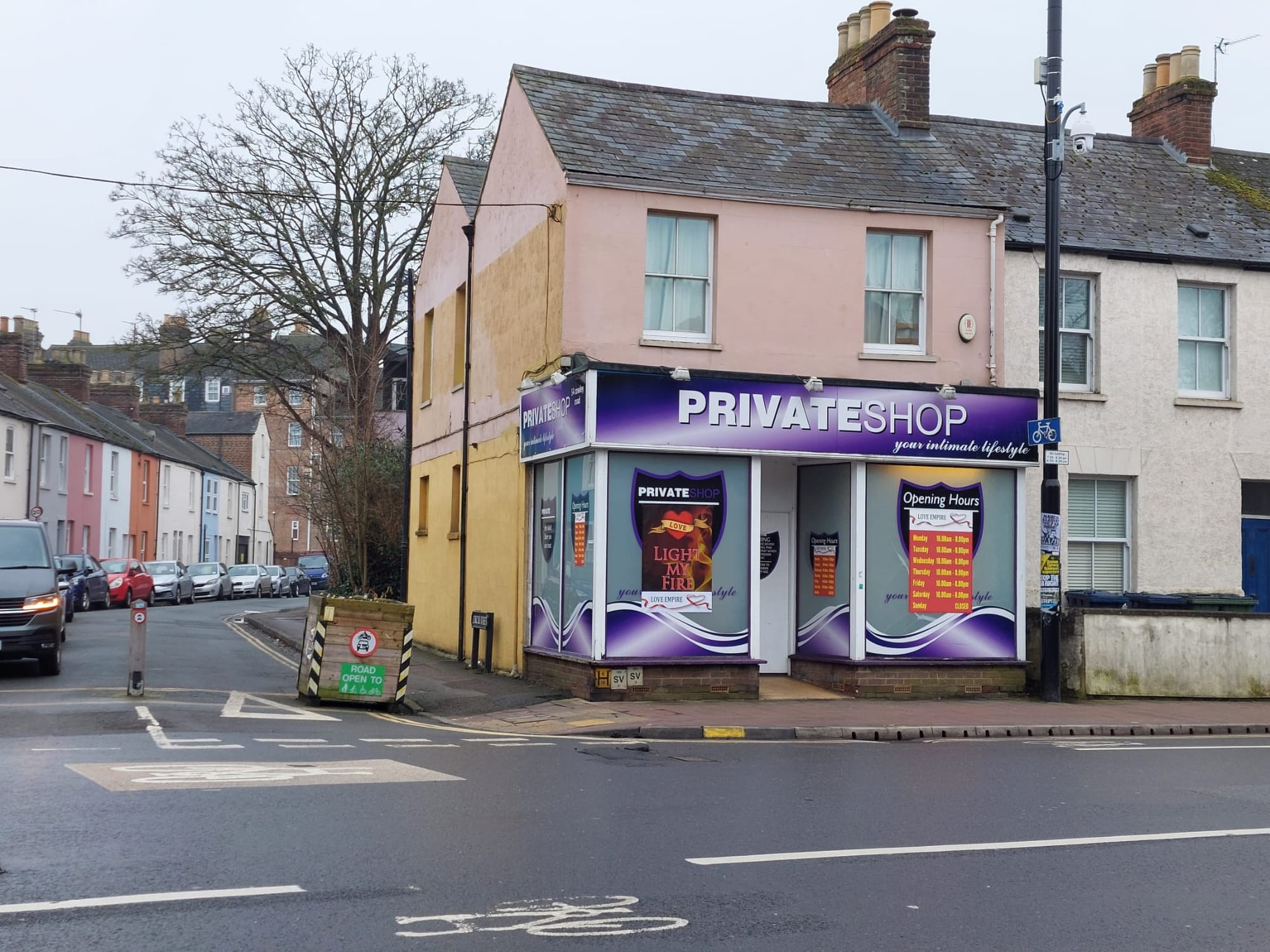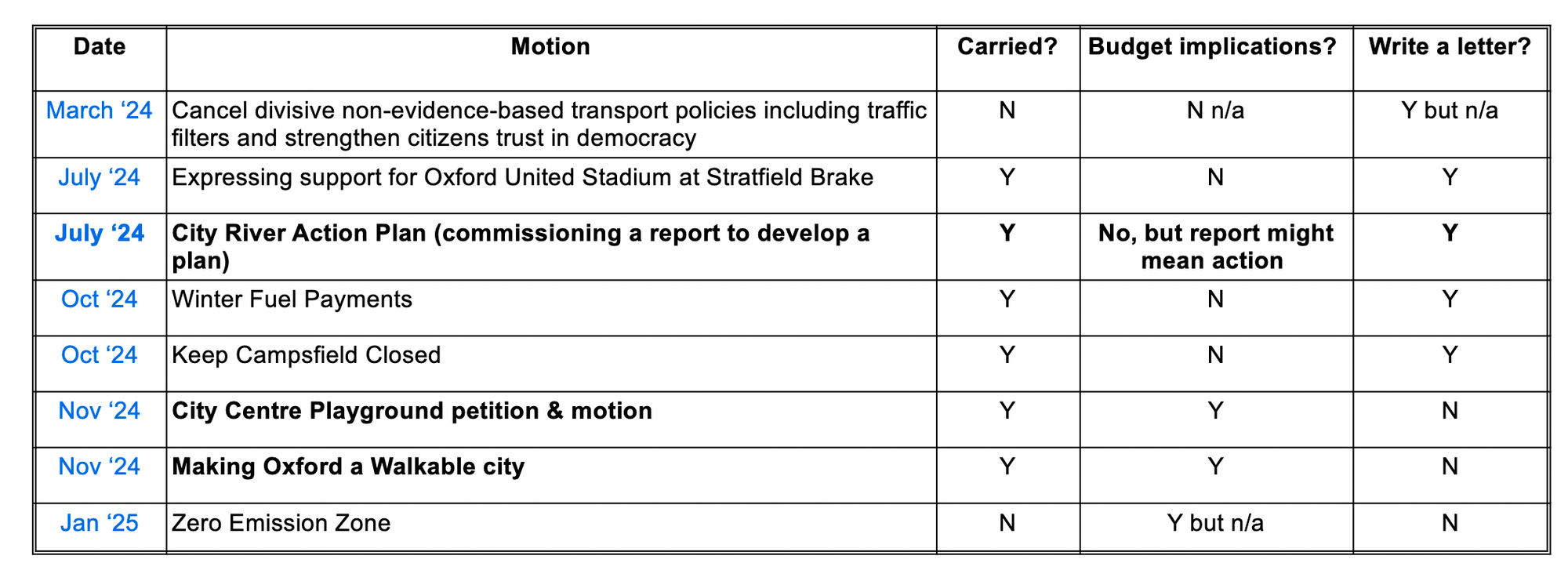Budgets in the city 2025

Once a year Oxford City Council sets its budget. It doesn't often make for good headlines (Giant pothole on A34! Emma Watson! Jeremy Clarkson’s dog!) but it should.
For the 165,000 people living in Oxford City, this is how the council will spend around £100m and materially impact your life for the next year. Let's start with what is it a budget for and, critically, what it is not. (If you are a regular Clarion reader, you may be able to skip this bit.)
Update, Wednesday 23.30: The amendments from opposition parties were published this afternoon, and we’ve updated this article to include a summary. If you’ve read this already, scroll to the bottom for the latest update.
Who does what
Oxford City Council is responsible for housing: the supply of housing, affordable homes, and the social register. It looks after refuse collection, licensing (pubs, taxis, local businesses), leisure centres, community centres, parks, graveyards, environmental health.
It does not look after traffic, low traffic neighbourhoods, potholes, schools, special education, libraries, or adult social care. That's the County Council. It also doesn’t do GP surgeries or hospitals (that’s the BOB ICB), policing (that’s Thames Valley Police), or firefighting. Pretty much everyone deals with some part of flooding. Nobody elected looks after the Botley Road debacle, that is a mess made by Network Rail and Thames Water. Oh, and all this might change next year when the Government reorganises councils.
Locally, the political make-up of Oxford City Council is fluid, with no single party having a majority. Of the 48 seats, Labour have 20, the Liberal Democrats 9, and the Greens 8.
The remaining 11 seats are divided between four groups of Independents. The Oxford Independent Alliance are the anti-Low Traffic Neighbourhood party with four councillors. The Oxford Community Independents (formerly the Oxford Socialist Independents) and the Oxford Independent Group, with three and two councillors, broke away from Labour last year over its Gaza policy. The Real Independents are two councillors representing Temple Cowley. (Obligatory Monty Python link.)
Labour are the minority administration. Though they politically align with central government, they are less and less able to blame the prior Conservative government for lack of funding with every month that passes. To pass the budget, they need to work with the opposition, or convince former Labour councillors to vote with them.

The budget is being set in an extraordinary political climate. Many councils are in tough financial situations, with inflation-busting council tax increases approved this week in a desperate attempt to balance the books. To take a nearby example, Windsor & Maidenhead are set to increase their council taxes by 9%.
Oxford City Council, however, is holding up well. It has its own ‘Oxford Model’, in which council-owned key companies provide reliable income streams which offset the need for these swingeing council tax rises. ODS (who empty your bins) also provide facilities management services, including road gritting for the County Council. OX Place builds housing, sells some, and lets others at social rent. Oxwed is a joint venture between Oxford City Council and Nuffield College to build Oxpens, a huge new proposed development in the west end that is set to materially change Oxford’s city centre.
The council put their budget out to consultation. Much is made of the responses approving the direction of travel, but that said, there were just 180 responses to the budget consultation out of a city of 165,000. You'd better hope those 180 people don't have vested interests.
(Any chance we'll get on with actually saying what's in the budget? Okay.)
General Fund Budget
Your council tax will rise, and if you own a business, so will your rates. But not by as much as other councils.
Inflation is about 2.5%. Government grants are down slightly overall, though homelessness-related grants have increased. The new National Insurance employer contributions will cost the Council £800,000 plus £500,000 for ODS; Government compensation for this is only £250,000.
To balance the books, business rates will rise slightly while the City's part of Council Tax will rise by 2.99%, just over £125 a year for a Band D home. In 2025/6 this will leave about £3m to be transferred to the reserves, but in the following three years, about £3million a year will need to be drawn from reserves subject to the shifting sands of council finance.
But don't worry about the council running out of money. According to their (unaudited) accounts for the year to 31 March 2024, they had £118m of usable reserves, up from £108m in 2023 and £101m in 2022. This is not money that the council aims to spend: it keeps it in contingency for major requirements. The fate of Slough, Nottingham, Woking and Birmingham shows why this is prudent: all four have issued ‘Section 114’ notices, indicating that the council’s income is insufficient to meet its forecast spending for the next year. (Bet you're glad to live here now.)
Capital (or car parks, the Covered Market and cycling)
The Capital Fund is huge at around £169m a year, dwarfing the General Fund at £30m. As you would expect, by far the biggest piece is housing. Building new (such as Oxford North, or the 51 affordable homes on the site of the former Northfield Hostel in Littlemore); buying housing from OX Place, including at Barton Park, thereby funding the council-owned company to develop more homes; and maintenance and safety works, covering everything from smoke detectors to walls and bin stores. Oxford City Council does earn some returns from housing through rents, and as it builds more homes, that revenue line is forecast to grow (and, self evidently, alleviate the city’s housing crisis).
Budget documents can be opaque. We wrote last year about our wild goose chase trying to understand the £7.2m spend on “Osney Bridge”, which turned out to be Oxpens Bridge. This year, we were puzzled by £36.2m over three years on an unnamed “Regeneration Property Purchase”. Nowhere in the budget documents is it explained what this might be.
But we did unearth, in the consultation responses, a reference to “Regeneration of the Odeon in the city centre: £36m”. Plans to demolish the Odeon on George Street (a council-owned site) and replace it with an aparthotel were approved at June 2023’s cabinet meeting. Those minutes say “the allocated budget” is explained in “Confidential Appendix 1”. Which we can’t see, because it is, obviously, confidential.
We fear that we may end up using this clip even more often than the ‘Splitters!’ one.
Other headline investments that will make a significant difference to the landscape of Oxford over coming years include:
- £250,000 for the Oxford Flood Alleviation Scheme
- £653,000 in 2025-26 on design and planning, then later £2.5m for the Cowley Branch line, which is set to be matched by funding from elsewhere
- £100,000 Templars Square regeneration
- £130,000 for car parking at the Ice Rink, which will certainly please the ice hockey teams who regularly comment on the challenge of getting to an early morning practice with a full kit on the bus
- £200,000 for the Jericho Community Centre (which is interesting given a community centre is part of the stalled plans to redevelop the wharf area) and £212,000 for East Oxford Community Centre
- £5m each year for 3 years on Blackbird Leys regeneration, with more in the housing fund
- £174,000 on city-wide cycling infrastructure coordination which will please many Clarion readers, although more is being spent on car parking
- £1m on works to the Town Hall
- £9.1m on upgrading the Covered Market
- £200,000 Hinksey Splash Park upgrade
- £1.3m for a new burial space
- £310,000 on swifter graffiti removal (currently only offensive graffiti is removed at pace)
City and district councils are sometimes seen as the poor relation to the big-spending county councils. In Oxford, that’s far from the case.


This Cowley Road establishment snapped by a Clarion photographer “just cycling past” (we thank them for their service), and the grandeur of an event in the Town Hall, are both covered by the budget.
Sex shops, dog wardens, and headstones
The City Council sets fees for everything from taxis to graveyards, which makes for some interesting reading.
The license for a nightclub, bingo hall or family entertainment centre doesn't increase, but running a sex shop goes up by 4%. If you hold a residents’ street party, you'll pay an extra £1 for your permit. A new fixed penalty notice (£400) for fly tipping commercial waste has been introduced. The cost for a swim session goes up by 30p, ice skating by 65p, and a penguin to hold on to is an extra 26p. Fees for a household planning application, like an extension, will more than double to £528. And did you know there was a fee for ‘Operations connected with exploratory drilling for oil or natural gas’? Don't worry, it stays the same. Just in case natural gas is discovered in Christ Church Meadow...
If you want to build a new home (or other development) the fee stays the same. But the fee to apply to put solar panels on anything at all doubles. Car parking fees increase significantly: short stays of under an hour go up by 28% in some car parks. Burials won’t cost any more, but erecting headstones will go up by 5%. Don't lose your dog, because the dog warden kennelling fees for a lost dog just went up by 41%. The pest control section on page 150 is frankly terrifying and we aren't going to write anything about it for fear of mucking up the algorithms of everyone reading this.
On a lighter note, getting married in the grand surroundings of the Town Hall goes up in price, but if you just want to hold a concert in the same space, it stays flat.
Perhaps the most symbolic change is one that has already been agreed by the council. From April, second homes can be charged double council tax, as can any home that’s been empty for more than a year. But there is much more we could write about: the budget files are extensive.
What’s not there
But what is perhaps more interesting is what is not in the budget. Bear with us; we're going to get geeky.
Since the last budget there have been six full council meetings. In those meetings, eight councillors’ motions were discussed. We've put them in a footnote so you can see.
Most simply called on the City Council to write a strongly-worded letter to someone. But two motions were carried which had potential budget implications. One called for Oxford to be made a ‘Walkable City’; another, on the back of a petition, for a children’s playground in the city centre.
We've looked very hard, but cannot see any funds relating to either of those motions in this budget. Which raises the question of what were the discussions in council for, if not to provoke action? Outside the ruling group, are councillors’ powers limited to writing anguished letters to the government, or should they concentrate on more substantive matters with an impact on the city we live in?
The Budget Review Group
One place where councillors outside the ruling group can be heard is the council’s scrutiny committee, and its dedicated Budget Review Group. This is a cross-party group of elected councillors from Labour, the LibDems, the Green Party and the IOA. Their report on the budget is illuminating. Among their recommendations are:
- Explore a tourist tax, currently the subject of a study
- Work with local retail centres to understand their individual challenges, and support them through marketing (this way to Brixton Village-style marketing for Cowley and Magdalen roads?)
- Pursue landlords whose property has been vacant for more than 12 months (in a 24-month period) to auction these properties for rent
- Take care to avoid ‘digital exclusion’ of vulnerable residents, but also…
- Identify savings from Artificial Intelligence technology
The Cabinet has accepted several of their recommendations; for example, the budget now includes funding for an officer to support businesses outside the city centre. Another suggestion it took on board was £100,000 to prepare for the Government’s planned reorganisation of local councils. The County Council, by contrast, has earmarked £5m for this. £100,000 would not be enough to plan the ‘Greater Oxford’ council that city leaders have mooted – but is this more a matter of playing the long game?
Amendments and next steps
In order to get the budget across the line, Labour has to persuade opposition parties to vote for it. As we saw at Oxfordshire County Council on Tuesday, the other parties will offer up their own amendments – either to get them implemented, or to conjure up a good line for a leaflet.
Unusually, Labour have reacted with an amendment to their own budget this time, drawing from the LibDem and Green amendments with a compromise they think could be acceptable to all. So what’s on offer?
The LibDem amendment
- £55,000 a year to hire a Homelessness Prevention Officer, which they believe will save the council money in the long term (albeit not assumed in the budget)
- £50,000 a year to tackle short lets (Airbnbs) by hiring a new permanent Planning Enforcement Officer, to relieve the city's housing shortage.
- £50,000 a year to make Oxford a “walkable/wheelable city” by fixing pavements and pavement surfaces
- £60,000 to progress the city centre playground scheme
What pays for this? Perhaps the most intriguing idea is “smart parking charging”. Building on a 2024 Green Party proposal, this would base parking fees on those vehicle characteristics that “damage our roads the most due to their weight, pose the greatest danger to pedestrians (particularly children) due to their height, or emit the most pollutants.”
It's also funded by reversing part of the Council Tax Reduction scheme. Bear with us. A year ago, an error led to some people on Universal Credit receiving too much of a rebate on their council tax. The LibDems propose to fix this in this budget year by immediately putting it back to the way it should have been, which generates more income. To cushion any shock, they would invest £50,000 into a Discretionary Housing Payment fund. Labour have a subtly different position on this, as you will see later.
Finally, remember the fabulously ugly Morrell Trophy sold off last year? This amendment proposes to repeat this pattern and raise £250,000 by selling council-owned items that are no longer on display or of significance to the city. These include antique guns and silverware, plus the “currently unused FC 1 registration plate once displayed on the Mayor’s car”. The plate used to belong to William Morris (Viscount Nuffield), founder of Morris Motors – and therefore the Cowley plant – and the first ever number issued by Oxford car licensing office. It was suggested for sale as far back as 2002, when the City Council still employed a chauffeur for the Mayor. How times change.
(Team Clarion are mostly bike geeks rather than car geeks, so we are puzzled as to why Oxford’s first registration was FC 1 rather than OX 1: the registration codes for Oxford start with an O. Any vintage car aficionados in our readership able to tell us why?)
The Green amendment
The Green amendment takes a collaborative approach, thanking the Labour administration for the changes it made between the draft budget and the final version agreed by Cabinet. As a result, their amendments are modest by nature, focusing primarily on providing funding for projects which the council has previously supported through motions (as we discussed above).
This amendment proposes:
- £80,000 to progress the city centre playground scheme
- £165,000 on making Oxford a walkable city: benches, water fountains, public toilets and improving pavements. (There's a ‘spend a penny’ joke in there somewhere.)
- £25,000 funding for advice centres
It will finance this by adding an additional £5 charge on the non-concessionary rate for garden waste bins; removing the proposed additional spend for graffiti removal; and selling the FC1 number plate.
The IOA amendment
The Independent Oxford Alliance propose to:
- Remove revenue funding for outdoor gym replacement
- Defund the proposed Learner Bike Park development fund (£80,000) and replace it with £25,000 of Bikeability training (net saving £55,000)
- Reduce the budget to grit bike paths and pavements by £16,000
These savings are used to fund:
- £60,000 feasibility study for a new Park & Ride to serve Cowley Branch Line
- £50,000 ‘roving’ City Council advice officer within community centres
- £25,000 enhanced lighting at Wood Farm shops
- £10,000 increased SEND support within community centres
The Oxford Community Independents amendment
While modest in monetary terms, the explanatory notes to this amendment pull no punches. They call out the administration for tabling a “cuts budget”, saying: “We don’t need to tie up our budget with gimmicks and nice spots for a photo opportunity. We need to have strong ideas that support our residents, and to maintain and improve the way that we deliver services and engage with residents.” Accordingly, they propose:
- Removing funding for replacing outdoor gym equipment (£100,000), saying it has limited users compared to leisure centres and sports pitches
- £25,000 on a fly-tipping amnesty three times a year for targeted areas, to improve “neighbourhoods that have been blighted by fly-tipping”
- £44,000 on an advice centre and customer experience funding to improve residents access to frontline services, particularly those that are digitally excluded
(We are genuinely interested as to how a fly-tipping amnesty would work. Is this a community waste collection day when the tip comes to you, with a skip being set up in a local car park? We’d like to hear more on this.)
The Labour amendment
An administration proposing an amendment to its own budget might seem strange. But this is Labour trying to get ahead of the game. Oxfordshire County Council’s budget on Tuesday concluded with the LibDems and Greens accepting some, but not all, of Labour’s amendment.
On the City Council, Labour is attempting to do the same, but setting out its stall in advance. It notes that the differences between the LibDem and Green and the budget are modest. (Where we can trace a suggestion to a party, we have noted it here.)
- Council tax reduction scheme: Full council tax reduction for those on the lowest incomes throughout the next four years, but cushioning the financial impact by increasing bands and levels of entitlement. (LibDem proposal)
- Selling off the family silver (and numberplate): they believe sales should only take place after consultation, which would mean within next year's budget consultation. If you care about selling off William Morris' numberplate, do remember to fill out the consultation next year. (Remember, only 180 people did this year.) (Lib Dem/Green proposal)
- Increased yield from parking fees: The council is cautious about increasing parking income via weight based vehicle charging, and while it proposed £20,000 to explore the scheme, deems it prudent not to over-forecast an increased corresponding revenue. (LibDem proposal, from an original 2024 Green motion that did not get voted on due to time constraints.).
- Increase Discretionary Housing Payments from year 2: “We believe that it is wise to increase levels of DHP to prevent homelessness.” (LibDem proposal)
- Homelessness Prevention Officer and Planning Enforcement Officer (LibDem proposal).
- Pavement works: In addition to pavement gritting in existing budget, funding to increase walkability, albeit at a lower level than proposed by either party in year 1, “to ensure appropriate design of measures” (LibDem/Green proposal)
- City Centre playground: £60,000 over two years to progress a city centre playground (subject to a site being found) (LibDem/Green proposal)
So where does that leave us?
Interestingly, once again, nobody has really touched the giant of the capital budget: the amendments lean in to day-to-day spends. We wonder why?
In the grand scheme of things, these amendments are modest, but do speak to the priorities of the different parties. Scrutiny and the budget consultation process have arguably reduced the need for swingeing amendments, so perhaps less (for those of us hoping for less than an OCC-style 8-hour meeting) of a drawn-out discussion in the chamber. Hooray for grown-up politics!
Regular Clarion readers will know our mantra is “is it real or is it for a leaflet”? There is plenty of both in here. There are 48 councillors: Labour has 20. It needs five more votes to pass its budget. Either the Lib Dems (9) or the Greens (8) would do it. If either of these are secured, Labour does not need the votes of the independents. Indeed, the Labour amendment largely ignores the alternative budgets of the independent groups.
Assuming an amended budget passes, there will be leaflet fodder aplenty. Labour can point to a balanced budget and a well-run council. The Lib Dems and Greens can point to the concessions they achieved. The independents will point to things they fought for and castigate the council for not taking them up. Everyone wins.
One final note. We tip our caps not just to the councillors of all parties working through the numbers, but particularly to the unsung heroes of this budget: the officers. The City Council is a big beast. The budget is complex. Priorities often conflict. There's never enough money to do everything. To have arrived at a balanced budget, with something close(ish) to a consensus, is nothing short of miraculous – whichever side of the political spectrum you sit. Good work, Oxford City Council. Same time next year?
Footnote
These are the councillors’ motions considered by full council meetings since last year’s budget, and their budget implications.

